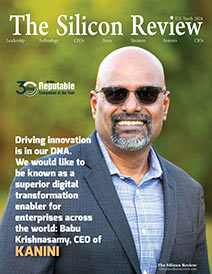Work with Diligent Robotics to bring Moxi into your hospital environment easier and faster than you may think!
The Silicon Review
![]()
Moxi by Diligent Robotics continuously adapts to changing hospital workflows by learning from human teachers along the way. As COVID-19 continues to change hospital environments, Moxi's workflows adapt to deliver PPE or lab samples where and when they're needed, supporting frontline workers. It’s not every day that a heart eyes 😍 robot crosses your path in a hospital, but robots will soon be the industry standard. Automation helps hospitals function more efficiently and gives back time to frontline staff so they can focus on patient care. Patients and visiting staff think Moxi is pretty cute, too. Burnout in the healthcare industry feels inevitable. Currently, nurses face significant physical, mental and emotional challenges in increasingly overburdened work environments.
The average turnover rate for Registered Nurses (RNs) in hospitals hovers around 20 percent within their first year in the field. Clinical staffs spend a reported average of 30 percent of their time on non-care activities like gathering medical supplies or restocking supply rooms. Staff clock up to eight to ten miles a day running back and forth to supply rooms, further diverting them from direct patient care. The top five things that nurses wish they had more time for include: emotional support, education, care coordination and discharge planning, care planning, and timeliness of care. With the ongoing complexities of attending to the changing conditions of patients combined with the demanding back-end tasks expected in healthcare shift work, there’s less and less time for meaningful face to face contact with patients. But with the right help, this can change.
People + Technology
Enter AI. To address these types of cognitive overloads many industries face, my focus as a technologist has been to utilize technology that learns, adapts and has limitless potential. We need to utilize the technology that has the power to not just create something new, but address something existing. And utilize the one that has the power to work with everyday people to address an existing problem or inefficiency. Moxi supports clinical staff by augmenting logistical tasks that limit valuable patient care time. By executing non-patient facing, logistical tasks that clinical teams are responsible for, Moxi creates a more efficient and thoughtful environment allowing for better patient care.
As a friendly, sensitive and intuitive robot, Moxi not only alleviates clinical staff of routine tasks but does so in a non-threatening and supportive way that encourages positive relationships between humans and robots, further enhancing clinical staff’s ability to and interest in leveraging AI in the healthcare industry. Created with a face to visually communicate social cues and able to show its intention before moving to the next task, Moxi is built to foster trust between patients and staff alike, setting the stage for future innovation and partnerships with developing technology. Moxi’s specific tasks and responsibilities at each hospital will be tailored to fit each hospital’s needs.
Q. What qualities does a cobot need to have?
For cobots to fulfill their mission as trusted, reliable members of human/robot teams, they must be able to operate in fast-paced and chaotic human environments. This requires the cobot to have a technical framework that allows it to adapt to variability using a variety of sensory inputs. In particular, Diligent believes that multi-sensory input that integrates visual, auditory and haptic (touch) data is crucial for cobots to operate in human environments. Cobots that can modify their actions based on the environment have the skill of what Diligent calls “adaptive object manipulation”.
The second quality cobots must have is the ability to assist with the highly precise tasks that humans have to do such as picking up items of tiny sizes on varying shelf heights — or what is known as “dexterous manipulation.” Diligent’s nurse helper robot, Moxi, for example, has a high degree-of-freedom arm and sturdy gripper hand that allows it to pick up objects of various sizes. Most importantly, Diligent believes that the key technical component cobots must have is the ability (and motivation) to learn from human teachers — or what Diligent calls “human-guided learning” or “human-guided exploration.” In human environments, things are always changing and evolving. Just as humans are always learning how to navigate Diligent’s changing environments and complete new tasks, cobots also need to have the framework that allows them to learn from their environment and from humans.
Meet the leader behind the success of Diligent Robotics
Andrea Thomaz is the CEO and Co-Founder of Diligent Robotics and a renowned social robotics expert. Her accolades include being recognized by the National Academy of Science as a Kavli Fellow, the US President’s Council of Advisors on Science and Tech, MIT Technology Review on its Next Generation of 35 Innovators Under 35 list, Popular Science on its Brilliant 10 list, TEDx as a featured keynote speaker on social robotics and Texas Monthly on its Most Powerful Texans of 2018 list. Andrea’s robots have been featured in the New York Times and on the covers of MIT Technology Review and Popular Science. Her passion for social robotics began during her work at the MIT Media Lab, where she focused on using AI to develop machines that address everyday human needs. Andrea co-founded Diligent Robotics to pursue her vision of creating socially intelligent robot assistants that collaborate with humans by doing their chores so humans can have more time for the work they care most about. She earned her Ph.D. from MIT and B.S. in Electrical and Computer Engineering from UT Austin and is a Robotics Professor at UT Austin and the PI of the Socially Intelligent Machines Lab.









